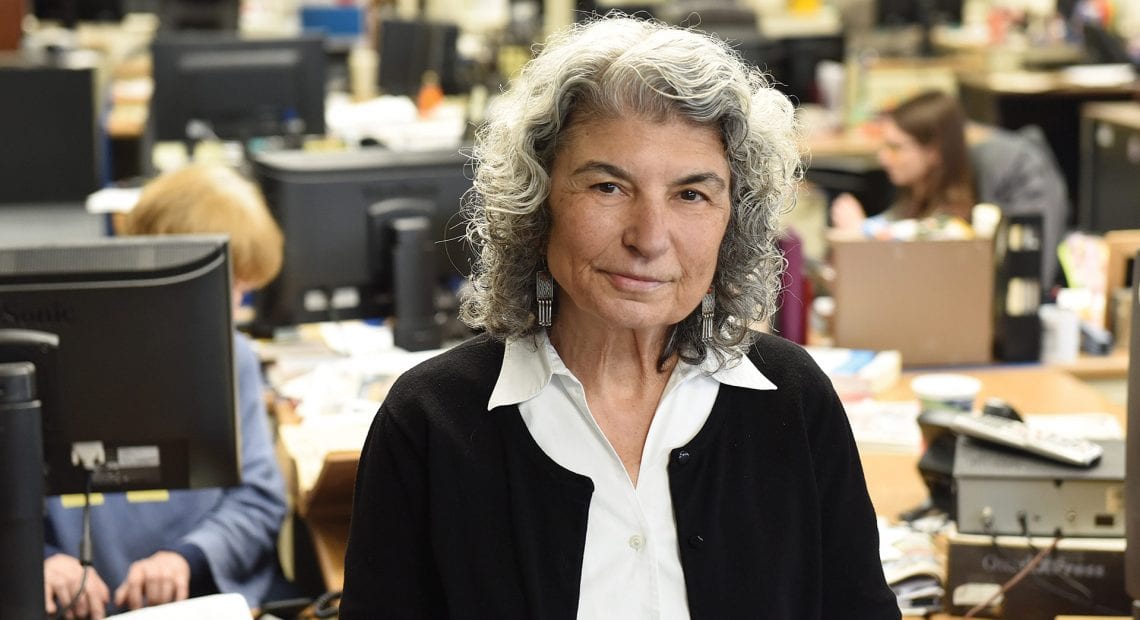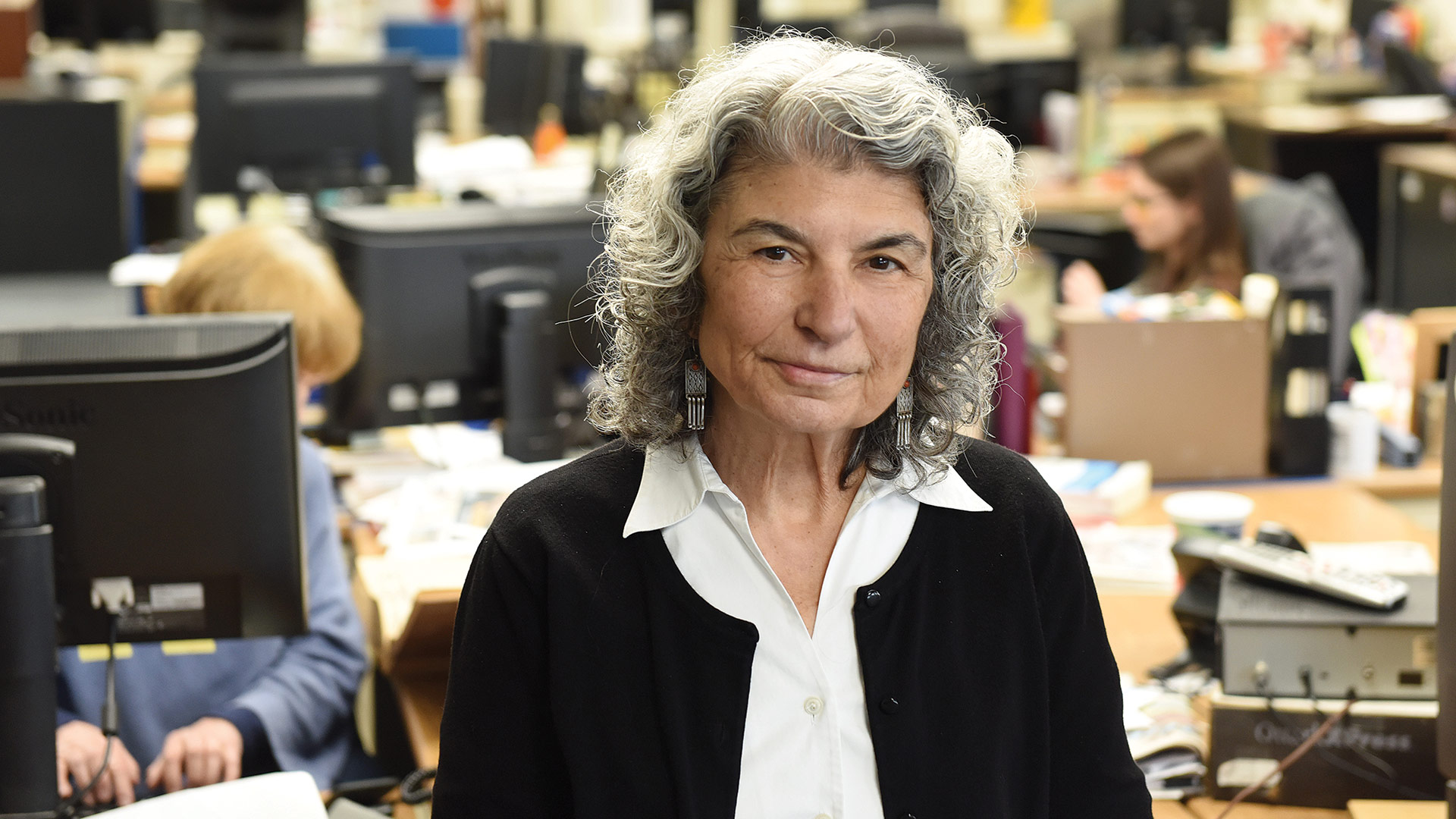
Greenfield Recorder Stays Locally Focused on Pandemic — and Everything Else
Words to Live By

Joan Livingston says reporters are working hard remotely, but she’s looking forward to the unique energy of a full newsroom.
Late last winter, Joan Livingston and her team at the Greenfield Recorder were planning a comprehensive, multi-part series of articles marking the 100th anniversary of women gaining the right to vote in the U.S. But, as businesses of all kinds can attest, plans made in February had a way of shifting in March.
“We were planning a series on suffrage; it was going to run, and we stopped that immediately,” said Livingston, editor in chief of a daily publication that covers some 30 communities in Franklin County and the North Quabbin region. But while the editorial focus may have changed — we at BusinessWest also remember, quite clearly, those early days of all COVID stories, all the time — the Recorder’s philosophy of hyper-local coverage did not change.
“That has remained our focus, how those communities have been impacted,” she said. “We had to shift gears pretty fast. We weren’t expecting this; no one was expecting this.”
Michael Moses, publisher of the Recorder and several other community newspapers in Western Mass. and New Hampshire, remembers closing all the buildings on March 16 and setting up reporters, designers, salespeople, and others at home.
“At that point, everyone wanted to work remotely, so we took steps to make sure they were able to work from home,” Moses said. “Like everyone else, we didn’t have a lot of time for planning for that, but everything came together pretty well. From an IT perspective, we were already teed up with our front-end system for the news to operate from anywhere, and that flexibility certainly helped us. So it was an essentially seamless transition.”
Since then, the newspaper offices have been open to employees who need to use them, from customer-service staff to the business offices, as well as some reporters, but in general, much of the work of producing these daily and weekly publications has continued remotely.
“A few people work only from home, some are hybrid and come in half the week, and then there are people like myself, who work in the newsroom all the time,” Livingston said of the environment at the Recorder, which is headquartered in downtown Greenfield. “We wear masks when we talk to each other, and we practice safe-distancing rules, but I miss that camaraderie, reporters just sitting around and swapping stories. I look forward to getting that back when things turn around eventually.”
That said, “I’m impressed with our hardworking staff,” Livingston went on. “They continue to generate coverage — that’s one good thing the pandemic did not stop. They’ve been great.”
Like all community newspapers with a wide coverage area, the reporters tend to stick to specific geographic beats, getting to know their communities intimately. The pandemic has shuttered municipal offices to the public and canceled annual events, making a reporter’s traditional in-person contacts harder to come by.
“I miss that camaraderie, reporters just sitting around and swapping stories. I look forward to getting that back when things turn around eventually.”
However, “business hasn’t stopped in terms of what’s happening in town governments, which we cover pretty heavily,” she added. “Some of it’s done virtually, we’ve had annual town meetings in cars or a field, and people have been inventive about trying to be safe during this time. That has been nothing like being in person, but we’re doing the best we can with what we have right now.”
At the same time, readers’ reliance on locally generated news is more critical than ever, especially in a year when locals need to understand how COVID-19 affects them personally, yet messages from national media sources and (especially) the internet have ranged at times from sensationalized to misleading.
That reporters are delivering that news by communicating with team members remotely is all the more impressive, Livingston noted. “Our computer system allows us to work anywhere, and that’s really helpful.”
It’s a slightly smaller team these days, too, she added.
“We had some layoffs after a few months [of the pandemic], and the paper got smaller because businesses are struggling and advertising is not their priority. But I’m impressed by the work ethic of the staff because we are down a few people, and hopefully, when things change, we’ll be able to restock those positions. But they’ve picked up the slack, and I’m impressed.”
Moses sees a silver lining in this year’s shifts in the way people work, because the industry was already moving in some ways toward more remote work, or at least asking questions about the best use of physical space.
“This has allowed us to accelerate where we were going anyway, so there are some positives to all this,” he said. “Like everyone else, we’re always trying to find efficiencies, and I want to be able to draw on those efficiencies.”
That’s not to say publishing hasn’t been challenging this year; it certainly has. “No surprise there, but, thankfully, we’ve been able to manage through it, and as difficult as it’s been, everyone has stepped up pretty well, regardless of which part of the business they’re functioning in.”
The Recorder did eventually get to that series on suffrage over the summer, examining the issue over a period of weeks, not only from a national perspective, but also — and maybe more importantly — through the lens of local history, local organizations, and local viewpoints.
That’s how the newspaper has continued to handle COVID-19 as well.
“I’m reminded every day that, on a whole range of subjects, whether or not they’re health-related, we’re helping readers manage through this, giving them critical news they need, and trying to provide them the right local information they wouldn’t be able to get anywhere else,” Moses said. “That’s even more critical now.”
Joseph Bednar can be reached at [email protected]





